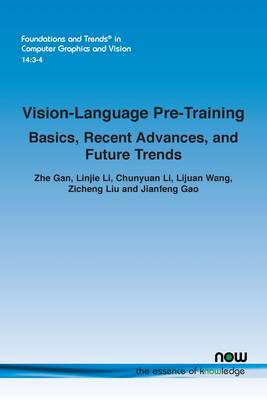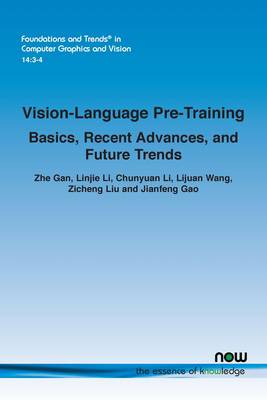
- Afhalen na 1 uur in een winkel met voorraad
- Gratis thuislevering in België vanaf € 30
- Ruim aanbod met 7 miljoen producten
- Afhalen na 1 uur in een winkel met voorraad
- Gratis thuislevering in België vanaf € 30
- Ruim aanbod met 7 miljoen producten
Zoeken
Vision-Language Pre-Training
Basics, Recent Advances, and Future Trends
Zhe Gan, Linjie Li, Chunyuan Li, Lijuan Wang, Zicheng Liu, Jianfeng Gao
€ 134,45
+ 268 punten
Omschrijving
Humans perceive the world through many channels, such as images viewed by the eyes, or voices heard by the ears. Though any individual channel might be incomplete or noisy, humans can naturally align and fuse information collected from multiple channels in order to grasp the key concepts needed for a better understanding of the world. One of the core aspirations in Artificial Intelligence (AI) is to develop algorithms that endow computers with an ability to effectively learn from multimodal (or, multi-channel) data. This data is similar to sights and sounds attained from vision and language that help humans make sense of the world around us. For example, computers could mimic this ability by searching the most relevant images to a text query (or vice versa), and by describing the content of an image using natural language. Vision-and-Language (VL), a popular research area that sits at the nexus of Computer Vision and Natural Language Processing (NLP), aims to achieve this goal. This monograph surveys vision-language pre-training (VLP) methods for multimodal intelligence that have been developed in the last few years. Approaches are grouped into three categories: (i) VLP for image-text tasks, such as image captioning, image-text retrieval, visual question answering, and visual grounding; (ii) VLP for core computer vision tasks, such as (open-set) image classification, object detection, and segmentation; and (iii) VLP for video-text tasks, such as video captioning, video-text retrieval, and video question answering. For each category, a comprehensive review of state-of-the-art methods is presented, and the progress that has been made and challenges still being faced are discussed, using specific systems and models as case studies. In addition, for each category, advanced topics being actively explored in the research community are presented, such as big foundation models, unified modeling, in-context few-shot learning, knowledge, robustness, and computer vision in the wild, to name a few.
Specificaties
Betrokkenen
- Auteur(s):
- Uitgeverij:
Inhoud
- Aantal bladzijden:
- 204
- Taal:
- Engels
- Reeks:
Eigenschappen
- Productcode (EAN):
- 9781638281320
- Verschijningsdatum:
- 5/12/2022
- Uitvoering:
- Paperback
- Formaat:
- Trade paperback (VS)
- Afmetingen:
- 156 mm x 234 mm
- Gewicht:
- 294 g

Alleen bij Standaard Boekhandel
+ 268 punten op je klantenkaart van Standaard Boekhandel
Beoordelingen
We publiceren alleen reviews die voldoen aan de voorwaarden voor reviews. Bekijk onze voorwaarden voor reviews.











